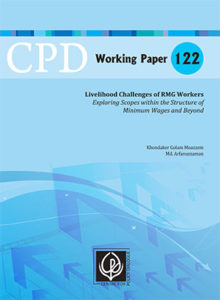 CPD Working Paper 122
CPD Working Paper 122
Livelihood Challenges of RMG Workers
Exploring Scopes within the Structure of Minimum Wages and Beyond
This paper examines the livelihood issues of the workers in the readymade garments (RMG) sector of Bangladesh, and identifies the scope of determining a minimum wage that would address their requirements of a decent livelihood standard. The study observes a compositional change in workers’ household expenditure patterns, where non-food expenses have taken up the larger share. Workers of all grades were found struggling to meet their essential needs, which indirectly implies that their earnings are inadequate for spending beyond the subsistence level. The study finds that, rise in the number of family members puts pressure to manage additional costs. The poor earnings of workers are also reflected through their possession of a very limited number of household assets. The study proposes a number of changes in the structure and composition of minimum wages, such as raising of basic house rent, inclusion of childcare and education allowances, amending the transport allowance, and adding service benefits. The study proposes minimum wage for entry-level workers at BDT 10,028 (USD 119). It further recommends a number of non-wage measures to improve workers’ livelihood through community development.
Contributors: Khondaker Golam Moazzem and Md. Arfanuzzaman
Publication Period: December 2018
Download the Paper


